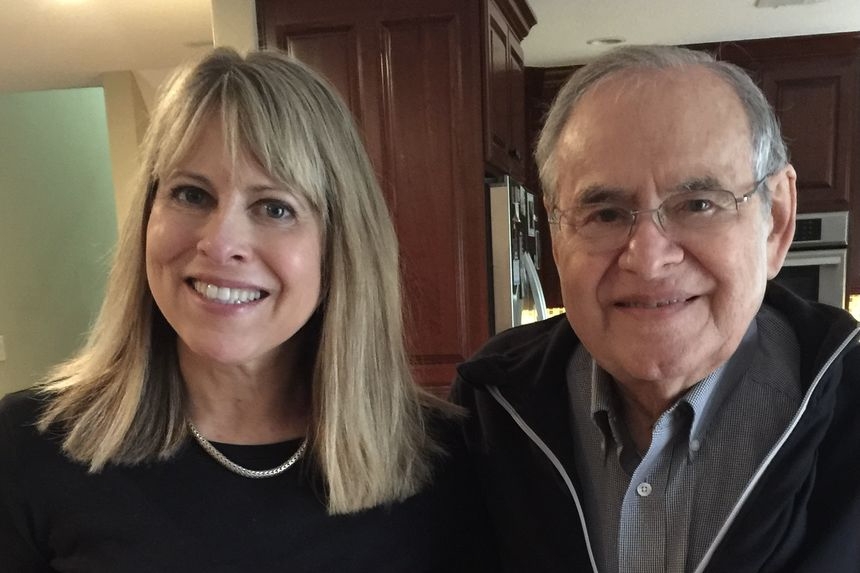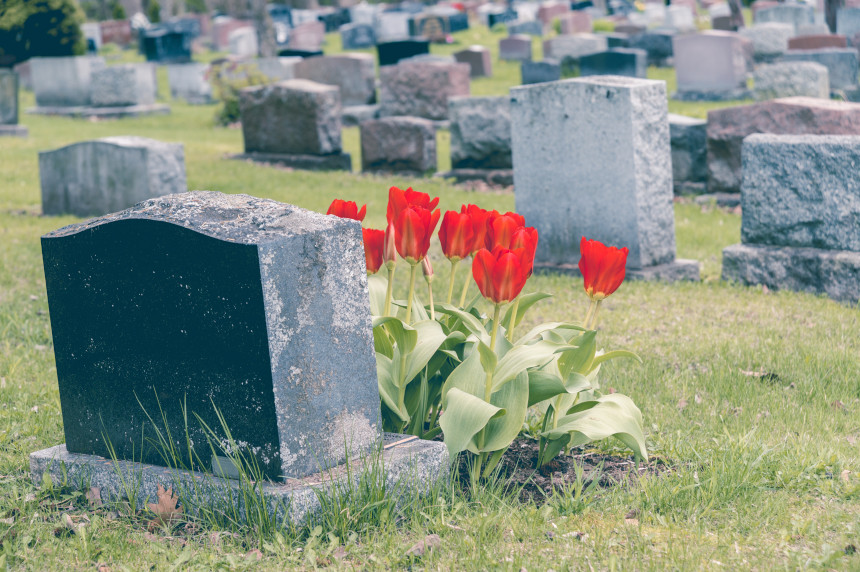“I want to buy plots for your mom and me,” my dad said one day over lunch at our favorite Chinese restaurant.
“She doesn’t want one,” I said, breaking off a piece of crab Rangoon. This wasn’t the first time he had brought up the subject.
“I know, but it’s bothering me that we don’t have a place to be buried. Will you help me?”
I looked across the red pleather booth at my dad, his grey and black hair smoothed to the side, the collar of his dress shirt peeking out from under his sweater. At 93, with the only wrinkles on his face gathered around his blue eyes, he looked at least a decade younger. His four-times-a-week workouts at the YMCA gave him not only strong legs but also a sense of pride.
Each time he asked me for help with the plots, I felt my throat tighten, thinking about my life without him. Finally, after making the same request for more than a year, my sweet yet determined dad wore me down. We left the restaurant, and I officially became his accomplice.
His reason for purchasing the plots was simple: He wanted to know that everything was taken care of before he died. I assumed he would eventually convince my mom of the need to plan ahead, but she waved him away each time he broached the subject.
“Not interested,” she said. My superstitious mom from Mexico believed that securing a plot meant death was imminent. She also thought that being left-handed was bad luck and shooed me out of the kitchen throughout my childhood when I stirred a sauce the wrong way or let the rice simmer too long.
As the middle of five children, I craved time alone with my dad, a busy pediatrician. Years later, I got my wish. Whenever I came to town, I took him to lunch at the same place where we shared chicken with vegetables and egg drop soup and where he practiced the Mandarin he had studied years earlier.

The more time we spent together, the more our relationship changed. He was still my father, but instead of focusing on my life and issues, a habit from childhood, I pressed him for details about his past. A few years before, he agreed to let me videotape his life story. He shared memories from his childhood in Poland to his time in Auschwitz to his life post-World War II as a physician in the Midwest. I wanted to learn more about his relationship with his parents and sister before they perished and how he managed to maintain a positive outlook after the challenges he faced early in life.
When he first asked me to schedule an appointment to purchase the plots, I wondered why he chose me over my siblings. Did he see me as more trustworthy? Was it because I was a former professional organizer and obsessive list-maker? I had helped him set up automatic payments and showed him how to convert his credit card points into gift cards a few months before. Even so, I wasn’t expecting to be the one to assist him with making burial plans — I thought my mom would eventually give in.
As we waited in the lobby for the woman in charge of the cemetery to meet with us, he said, “I’m not going anywhere soon. But I want to know that everything is set.” She led us to her cubicle, and after she pulled up a map of the cemetery, we weighed the options. Did they want to be far from the street or under a tree? Would they want to be buried near my late mother-in-law?
Finding the perfect burial plot was like searching for the ideal Airbnb rental in an unfamiliar city. But this wasn’t for a single weekend; it was for eternity. I felt self-imposed pressure to find the right place for my parents, especially when my dad left it up to me. “It doesn’t matter to me,” he said. “It’s for you guys.”
He signed the paperwork, and on the way to my parents’ house, I saw my dad’s furrowed brow and suspected he was thinking: How will I tell my wife? I sympathized with him. My mom never shied away from expressing her opinion, but I was familiar with his ability to calm her down. He never kept anything from her, but this was different. His need to secure a final resting place outweighed her insistence that making burial arrangements would lead to disaster.
Every few weeks, I asked my dad if he had mentioned our secret mission to my mom. “Not yet,” he always answered. Then, one night, while setting the table in my childhood home, I overheard a conversation in the kitchen.
“Your father is losing it,” my mom said.
“He seems fine,” my sister told her.
“He thinks he bought two plots.”
I looked at my dad, then back at my mom. There was no need to ask him whether he had told her.
“We did buy two plots,” I said.
“What? Why didn’t you take me with you?” she asked while glaring at my dad.
“I asked, but you didn’t want to go.”
Prepared for a lengthy argument, my mom surprised me by asking about my children. She never mentioned the plots again.
Less than a year after our stealth mission, my dad’s health quickly declined, and his trips to the YMCA stopped. Instead of living an active lifestyle, he led a sedentary one in his gray chair surrounded by his paneled family room. One afternoon, he fell on the back deck. After a short hospital stay, he was sent home on hospice care and died three days later.
A few days after the funeral, I took my mom to the cemetery. We stood at my dad’s gravesite, a mound of dirt heaped on top with a small white sign — a temporary marker until his bronze one arrived — stuck in the ground. As I read his name, I recalled his words: “This is for the family.” The knot in my stomach loosened. I pictured the look of relief on his face more than a year before as he signed the contract confirming the plots and felt my shoulders relax. Being part of his systematic approach to death and knowing he trusted me with a vital task eased my anxiety and grief.
Still, I wondered whether I had chosen the right place for him to be buried. Then I noticed the building nearby — it was a YMCA! And when I glanced beyond his grave and spotted slides, tunnels, and a sandbox, the space felt perfect. I smiled at the thought of my dad, who dedicated his career to caring for children, eternally resting near the sounds of little ones playing.
Featured image: Marc Bruxelle / Shutterstock
Become a Saturday Evening Post member and enjoy unlimited access. Subscribe now




Comments
I’m proceeding on the assumption that people are still lucid enough to understand that the following does not constitute an apology for Naziism:
ewleeds makes an unnecessary apology for reality.
The reality is that World War I. was the great catastrophe of the 20th century, without which World War II. could never have happened. Many books have been written on the war’s Armageddon – like effect on Great Britain alone, because most of the men whose talents and training had been thought to have qualified them to lead mid – century Britain had been killed in France. The loss of German men in the war had been so ruinous that unless careful historians unknown to me have found evidence to the contrary, the leading occupation of women in Weimar Germany was prostitution.
As for “Christian soldiers,” one credible reason for the war’s having happened at all is that at the beginning of the 19th century, Europe had been resolutely Christian, but by the beginning of the 20th, European Christianity had become moribund.
If ewleeds inquires, the person will learn that Britons of the 30s, grief – stricken, underpopulated in general and deprived of much of what would have been their rising class of leaders because of the carnage in France, and stricken terribly by the Great Depression, could not bear to imagine that another war with Germany could happen in their lifetimes.
Consider, please, that the people who had the most to lose from such a war, German Jews, could not believe it would happen.
As for the United States, though what we had suffered in troop casualties in World War I. didn’t begin to compare with those of the European militaries, the American people had been appalled by the losses we had had. If the newspapers of the 1920s needed things to write about, they had our own terrible bereavement to cover, as well as the ongoing ruin of the lives of a mass of war survivors left with severe disability. Americans had not wanted to become involved in a European war, ever. Our relatively mild experience of that one only deepened our traditional isolationism. Our Army of the 1930s was so scrawny that when Pearl Harbor was hit, the 50 year old Dwight Eisenhower was still a Major. His brilliant gifts had been so apparent by 1917 that he was withheld from action in World War I., lest a potential warlord of an unimagined future be lost instead of a no less valuable man who lacked Eisenhower’s talent, yet twenty – five years later, he hadn’t been needed at even the level of a colonelcy because the Army was as undersized as it was.
It’s easy to make policy in retrospect.
ewleeds may be one of those who blames the wielders of Allied air power for not having used it to bomb the railways to the death camps. The Holocaust Museum will inform ewleeds that we didn’t do it because aerial bombardment of scattered targets in countryside had something like a 2% chance of hitting an intended target. We probably could have expended enough materiel to have done it, but if we had, we wouldn’t have had enough left to have fought the war against the Wehrmacht. We made the decision to destroy the Nazi war machine, because the quicker we did that, the sooner we could stop the murders.
Hitler made that both easier and harder for us to accomplish, easier because he diverted considerable German resources away from fighting the war, harder because he diverted it to his more important goal, the Holocaust.
Of course, we made terrible mistakes, the “voyage of the damned” being one of the most heartbreaking, but we ought not to be apologetic about what we couldn’t have known.
As a past owner of a monument company, we encouraged couples to purchase their cemetery lots while there was no pressure on the decision. If a head stone was purchased at the same time all the better for those who would have to make that decision later. Please consider purchasing your own lots now …. Time has a way of passing quickly and we never know what tomorrow will bring.
Lisa, thanks for sharing that experience with your father. Losing a parent is never easy, no matter their age. My grandfather purchased enough burial plots for his family, so when my parents passed away, that was one less thing we had to worry about during our time of grief. I hope when it’s time for your mother to leave, you will have some comfort remembering your father’s wise decision to go ahead and complete that one task.
Lisa, May I apologize on behalf of Christians everywhere for what happened to your father a former Auschwitz prisoner, and millions of other innocents during WW2, it’s my view that all Christian nations are collectively guilty for this tragedy and our so-called Christian Soldiers were too slow to respond to the Nazi threat during the 1933-1939 period. To make matters worse all nations including my own – England, failed miserably in 1938 to offer Germanys Jews safe homes, passage, and support. Both our Governments did nothing and neither did every major faith. To make matters worse European Police officers ignored the illegality of what the Germans were doing and they actively co-operated in the roundups and deportations. Anne Frank and her family were arrested by a Dutch Police officer. In 1945, over 10 000 leading Nazis went into hiding. and the deaths of millions of people including 2 million Russian POWs mostly went unpunished. My apologies.
That was Beautiful !!! Thanks for sharing.️
Thanks for sharing this story, Lisa. Upfront I’d like to say you did everything right, and things worked out with the plots better than you realized at the time of the purchase. I have a feeling you may have had an edge over your siblings in your father’s eyes, likely helped with the lunches and special interest you showed in his life going way back.
Your dad had good timing. The plots might not have been available much longer, and his health wasn’t going to be either as it turned out. What a nice gift of comfort it was for you to fully realize the location was perfect as you described a few days later, at the gravesite. I can see how it would have eased your anxiety and grief at that difficult time, and hopefully still does now.